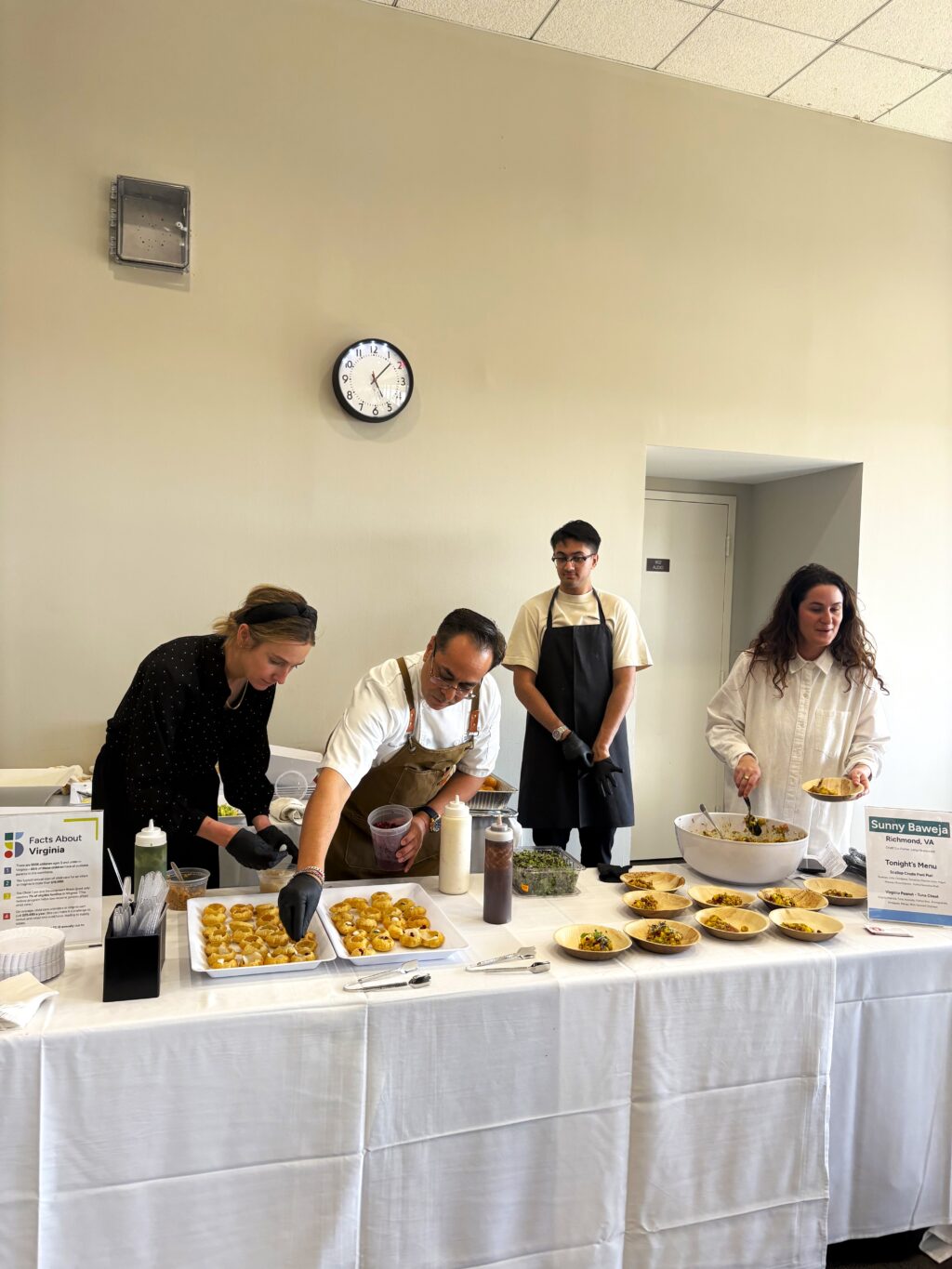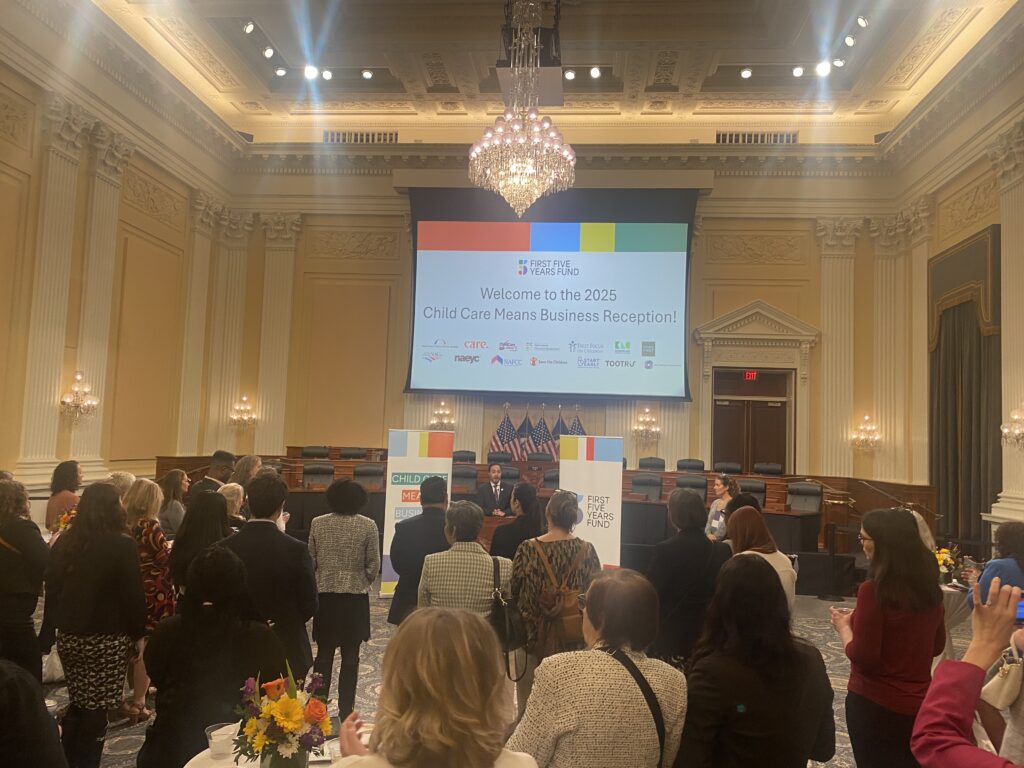The First Five Questions for Hollis Wells Silverman

In this month’s FFYF’s First Five Questions series – which brings together interesting leaders, experts, and voices together to talk about child care challenges and solutions – Executive Director Sarah Rittling sat down with 2024 James Beard semifinalist Hollis Wells Silverman, owner and founder of Eastern Points Collective and many beloved D.C. restaurants, including La Collina and The Duck & The Peach.
As a community and business leader, Hollis knows firsthand that access to child care is key to running a successful restaurant. She has been a powerful advocate, using her platform to bring attention to the need for child care and early learning solution.
Check out the video below and read the Q&A* to hear what Hollis thinks about child care challenges facing the restaurant industry, solutions, and hopes for the future.
First Five Questions: A Conversation with Hollis Wells Silverman
Sarah Rittling: Welcome! Today, I’m delighted to be joined by my friend, Hollis Wells Silverman, owner and founder of Eastern Points Collective, and many beloved D.C. restaurants and bars, including La Collina, The Duck & The Peach, The Wells, and Méli Wine & Mezze. As a business leader, she knows that access to child care and issues facing parents is key to running a successful business, and she’s working single handedly to ensure her team and businesses across the country have access to that.
Welcome, Hollis!
Hollis, you’ve worked in the restaurant industry your entire career, and have owned and operated your own restaurant company for over five years – during which you designed, built, and opened two restaurants and a bar at the height of the pandemic.
This is an incredible task, and you’ve done it successfully, but your goal is not solely to serve delicious food in a beautiful and welcoming place. The mission of your company is to, “change hospitality through integrity and grace by constantly seeking new ways of operating that create a better life for everyone involved—team members, community members, and guests.”
Question One:
Rittling: You are out to change the culture of the industry and the world, all of which you’ve been recognized for as a semi-finalist for the James Beard Award as Outstanding Restaurateur. Congratulations.
What issues are you seeking to tackle?
Hollis Wells Silverman: There’s so many issues to tackle but without a great team you can’t tackle any of them. So I’m very grateful for my team, first off.
Number one is really looking at how we pay our team in restaurants, and looking to create more equality and stability. There’s a really big pay disparity between the front of house and back of house. The front of house, which is your servers and bartenders, are typically tipped. So they’re paid a very low wage and then some, depending on how the guest feels that day.
How we tackle this is we do a 22% service charge. And this is due to the federal labor laws. So because of those labor laws, we have to find alternatives in order to pay our team and use that money to pay the team. So that’s one of the issues.
And then also really trying to create more growth and more longevity for women, especially caregivers in this industry. Something I noticed after being in this industry for a while is that it’s really hard when you have kids, or if you’re trying to have kids. It’s not a conducive environment, hours, or culture to really do that.
So I wanted to create something different, because there’s so many amazing people in this industry and we’re really looking to have them stay in this industry and thrive.
Question Two:
Rittling: Your executive chef and pastry chef just welcomed new babies to their families. Can you tell me the unique issues women in the hospitality industry face as working parents to children of all ages, but certainly our littlest?
Silverman: Well, I would say that the issues they face are very similar to what a lot of people working outside of the home face: child care. It’s expensive,figuring out how to balance everything, logistics.
There’s a lot I would say: child care, especially early child care, is really challenging. Until children hit school age, usually that’s about a five year gap. And then people are always asking “Well, what have you been doing for the last five years?”
Rittling: And you supported the new moms on your team.
Silverman: We did. This was really exciting: We were able to give not only maternity, but paternity leave, for people that have been with us a year. (Rachelle and Kat both are coming up on 3 years.) We were able to support them through different benefits: short term disability, long-term disability and then pay them for 3 months while they were not working.
Rittling: That’s a big deal.
Silverman: It was a really big deal, and it really gave them that time off, too. A lot of places will give time off, but then they’re still working, or they’re still feeling the pressure.
When I had my first child, I took maternity leave, and it was really hard trying to figure out how to make it work. Because, at the same time, you’re trying to figure out how to get paid, because most people don’t get paid during maternity leave and only a certain amount of salary is covered.
I had to go back to work pretty early, or start working a little bit here and there, which is really hard when you’re a new mom and trying to figure out all the things and then open restaurants or run restaurants.
So it’s really challenging, and also for chefs, too. And our industry is an in-person industry, it’s not remote, so it’s a very different challenge that people face.
It’s a great part of our industry, because you do get a lot of interaction with people and guests which is why we love it. But it’s not something where you can just call into or work remotely.
Question Three:
Rittling: What is the blue sky solution? What if tomorrow you could tap the magic wand and build the culture and industry that you wanted for working families. What would you do?
Silverman: Oh, my goodness, okay. I would change the federal labor laws and I would make sure that there is no tipping. Benefits would be given to people right away. In our industry, it’s typical that you have to wait a year in order to get benefits.
And for caregivers and parents, there would be affordable child care. And everywhere would have free Pre-K, before care, and aftercare
Rittling: You’re hired. Come work for us.
Silverman: And tax incentives for businesses, because you have to help the caregivers at home – and pre-K 3, pre-K 4, and after care – but then also incentivize the business. Everybody wins. More people are working or going back to work.
So I really feel that people just don’t see the value in that. And they don’t see the untapped resources of all of these caregivers at home. I mean, there’s so much brilliance, there is so much talent, and when you see people and you give them that opportunity – you create a culture where you also give some flexibility.
You have to give flexibility to the caregivers, especially for the littles. For the two chefs we have here, their kids are in daycare for the first time.
For those that have had daycare before: Everybody’s sick all the time. They’re just building up their little antibodies. It’s really hard. Then you’re back at work and you’re figuring out all the things – like breastfeeding and doing everything else.
So you’ve got to give people grace. There’s some of those days where people have to say “my kid can’t go in [to day care] so I can’t come in”. And that’s when the other parts of the team and the other people rally around each other. That’s a really awesome part, because they can still do the thing they love with this new little thing they love.
Rittling: You do have a great team.
Question Four:
Rittling: You touched a little bit on this, and you’ve been on Capitol Hill and talked about these issues before. You’re a doer: you see an issue, you want to try to tackle it, and you’re going to tackle it as a business owner, and certainly as a woman in this world.
But what do you wish more members of Congress understood about these issues? You touched on some of the laws, but I think that you’re getting into some of the nuances of it. It is not a one size fits all – there’s a lot of different people coming at this bringing solutions. So, what do you wish more members of Congress on Capitol Hill knew about this range of issues?
Silverman: For me personally, I wish people understood how restaurants work. A lot of people make assumptions and they do things, and they don’t understand how restaurants work. They don’t understand why there is tipping. They don’t understand how the federal labor laws are written which prohibit tips from being shared with the back of house. I really wish there was just more education on that for people, which is why we do certain things.
And, understanding how hard it is to be a caregiver and have a little one. Those first five years are really, really hard – before school – because not all places have flexibility and day care is so expensive.
I wish they [Congress] would educate themselves a bit more if they did not know about how restaurants work: how hard it is to be a parent, a mom or a caregiver and trying to get back into the workforce.
And I wish they understood and looked at the businesses that were trying to do the right things, and that there were a lot more incentives for businesses and more ways to help support that.
There’s things that can simply be done through education and like, I said, some day care options, or looking at how some of the people that work in these industries are paid.
There’s so many different levels. And I wish that they would really look at the people that are trying to make those changes and figure out how to support those businesses better and incentivize because right now we’re incentivizing the wrong things.
Rittling: You’ve been so creative and responsive to the needs of your team and been able to provide paid leave. And [creative] when we talk about the pay, and finding solutions even in the face of some of those obstacles. But when it comes to trying to support your team and child care, it’s just such a complicated thing.
And I know ways in which we’ve talked about just how hopeful we are. There are some incentives and ways in which we can provide support from the federal level or even the state – or in your case – D.C. – to be able to to allow you to do some more of that. So I appreciate that.
Silverman: Also, it would be really great if members of Congress could find ways to also look at how we can create opportunities with other businesses and also maybe incentivize that? You’ve got to be creative.
Restaurants, we can’t afford to have on-facility child care. Nor does it make sense based on my size.
But, I always look at a friend I had that worked for a law firm. I was like, “you have daycare in your building? That’s incredible!”
Maybe we can figure out some way to use that. Because that law firm, they have people there. Or look at ways to incentivize developers and say, “Hey: Why don’t you use your space, and make it really affordable, for a child care facility to go in there.”
I really wish there was a bit more innovation and figuring out how not to be so rigid. Because it’s with that flexibility you really can innovate and create that change that’s needed.
Rittling: Totally agree.
Question Five
Rittling: What gives you hope?
Silverman: What gives me hope is my team. Seeing that making things happen for them, giving them a place where they can come, and they know that they can live their dreams, and that having a family isn’t gonna stop that.
And that’s a lot of what I’ve had conversations about. [People say], “How am I going to do this? I really want to have a family, but how? How am I going to juggle all the things?”
And so when you see them thrive, and you see how excited they are that they’re able to do this: That’s really what gives me hope.
And spreading of the word, and more people that say okay, great: “This can be done.” And when people ask questions, and they’re like: “Okay, this is great.”
People give me hope when they see you can really do this, and that there is a career in restaurants when you can have a family.
Rittling: Well, you give me hope. So thank you for all that you’re doing, and I learn something every time we talk. Certainly, about your business and the realities of it. I’m hopeful, because you’re constantly trying to make your own team better, but certainly the world. So thank you for being you. Thank you for spending some of your morning with us and being part of our First Five Questions Series.
Silverman: Thank you so much. It’s been an honor and a pleasure. And you’re amazing – wouldn’t be here without you.
*Note: This Q&A has been lightly edited and shortened for publication.
Subscribe to FFYF First Look
Every morning, FFYF reports on the latest child care & early learning news from across the country. Subscribe and take 5 minutes to know what's happening in early childhood education.



